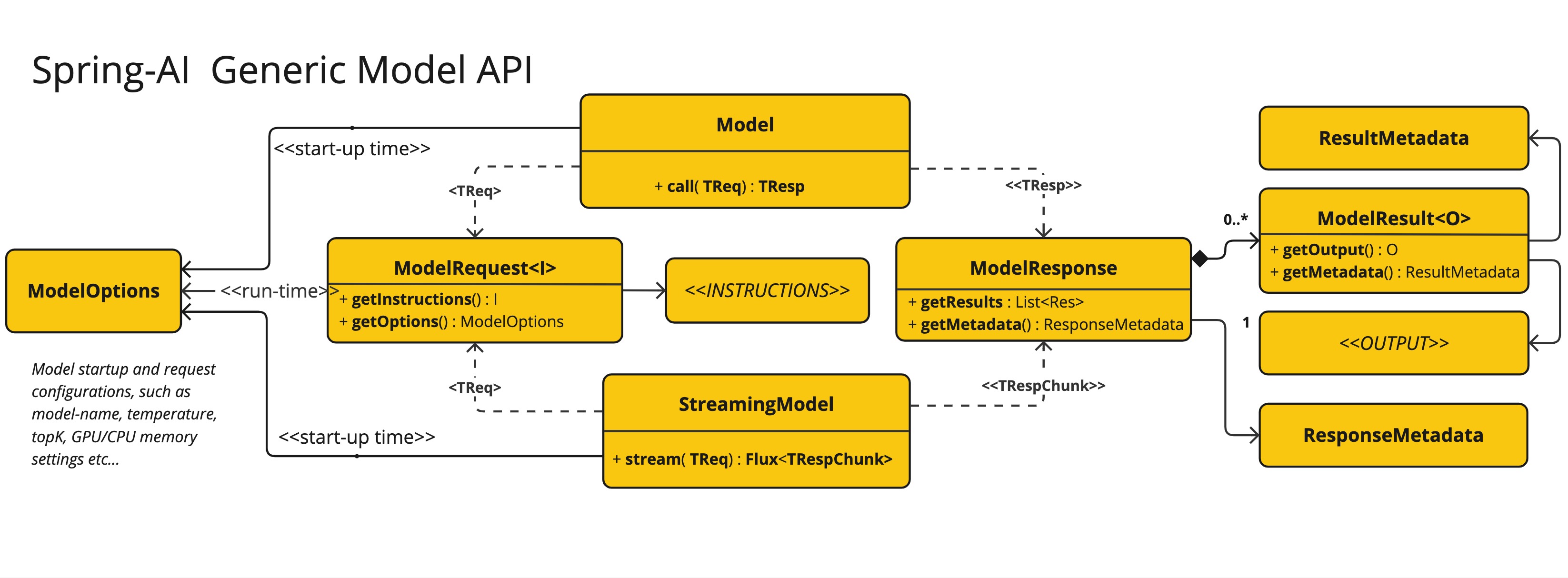Generic Model API
In order to provide a foundation for all AI Models, the Generic Model API was created. This makes it easy to contribute new AI Model support to Spring AI by following a common pattern. The following sections walk through this API.
Model
The Model interface provides a generic API for invoking AI models. It is designed to handle the interaction with various types of AI models by abstracting the process of sending requests and receiving responses. The interface uses Java generics to accommodate different types of requests and responses, enhancing flexibility and adaptability across different AI model implementations.
The interface is defined below:
public interface Model<TReq extends ModelRequest<?>, TRes extends ModelResponse<?>> {
/**
* Executes a method call to the AI model.
* @param request the request object to be sent to the AI model
* @return the response from the AI model
*/
TRes call(TReq request);
}StreamingModel
The StreamingModel interface provides a generic API for invoking an AI model with streaming response. It abstracts the process of sending requests and receiving a streaming response. The interface uses Java generics to accommodate different types of requests and responses, enhancing flexibility and adaptability across different AI model implementations.
public interface StreamingModel<TReq extends ModelRequest<?>, TResChunk extends ModelResponse<?>> {
/**
* Executes a method call to the AI model.
* @param request the request object to be sent to the AI model
* @return the streaming response from the AI model
*/
Flux<TResChunk> stream(TReq request);
}ModelRequest
The ModelRequest interface represents a request to an AI model. It encapsulates the necessary information required to interact with an AI model, including instructions or inputs (of generic type T) and additional model options. It provides a standardized way to send requests to AI models, ensuring that all necessary details are included and can be easily managed.
public interface ModelRequest<T> {
/**
* Retrieves the instructions or input required by the AI model.
* @return the instructions or input required by the AI model
*/
T getInstructions(); // required input
/**
* Retrieves the customizable options for AI model interactions.
* @return the customizable options for AI model interactions
*/
ModelOptions getOptions();
}ModelOptions
The ModelOptions interface represents the customizable options for AI model interactions. This marker interface allows for the specification of various settings and parameters that can influence the behavior and output of AI models. It is designed to provide flexibility and adaptability in different AI scenarios, ensuring that the AI models can be fine-tuned according to specific requirements.
public interface ModelOptions {
}ModelResponse
The ModelResponse interface represents the response received from an AI model. This interface provides methods to access the main result or a list of results generated by the AI model, along with the response metadata. It serves as a standardized way to encapsulate and manage the output from AI models, ensuring easy retrieval and processing of the generated information.
public interface ModelResponse<T extends ModelResult<?>> {
/**
* Retrieves the result of the AI model.
* @return the result generated by the AI model
*/
T getResult();
/**
* Retrieves the list of generated outputs by the AI model.
* @return the list of generated outputs
*/
List<T> getResults();
/**
* Retrieves the response metadata associated with the AI model's response.
* @return the response metadata
*/
ResponseMetadata getMetadata();
}ModelResult
The ModelResult interface provides methods to access the main output of the AI model and the metadata associated with this result. It is designed to offer a standardized and comprehensive way to handle and interpret the outputs generated by AI models.
public interface ModelResult<T> {
/**
* Retrieves the output generated by the AI model.
* @return the output generated by the AI model
*/
T getOutput();
/**
* Retrieves the metadata associated with the result of an AI model.
* @return the metadata associated with the result
*/
ResultMetadata getMetadata();
}

